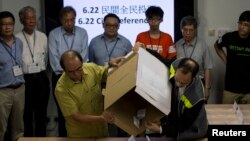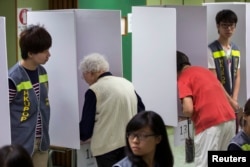Hong Kong and Chinese officials and lawmakers are considering how to deal with a new political reality in which almost 800,000 Hong Kong residents made an unprecedented show of support for greater democracy by participating in an unofficial referendum.
Occupy Central With Love and Peace, a movement of Hong Kong pro-democracy activists who organized the 10-day referendum that ended Sunday, said 792,000 citizens cast valid ballots. The vast majority of them used Internet and mobile phone, though several thousand cast paper ballots at polling stations. Hong Kong had approximately 3.5 million regisered voters in 2012, according to The Guardian.
In another pro-democracy demonstration, more than 100,000 people joined an annual July 1 march through Hong Kong’s streets on Tuesday to call for the ability to freely choose the territory’s next leader, or chief executive. Police arrested at least 500 protesters on charges of unlawful assembly for holding a sit-in on a street next to the government headquarters after the march.
In the first-of-its-kind referendum, Occupy Central asked residents whether they supported one of three proposed electoral reforms that would allow the public to nominate candidates for the city's next leadership election in 2017.
Voters also were asked whether Hong Kong's 70-seat Legislative Council, or LegCo, should veto any government plan that does not satisfy "international standards allowing genuine choices by electors."
Beijing has said the autonomous Chinese territory can choose its chief executive under a system of universal suffrage for the first time in the 2017 election. But, it says the nomination of candidates must conform to the city's constitution, or Basic Law, which gives nominating powers to a "nominating committee" rather than directly to voters. Hong Kong's government has said it must abide by that requirement.
Analyzing referendum
Referendum organizers say the most popular proposal for nominating chief executive candidates came from a coalition of 26 of the city's 27 pro-democracy lawmakers. The Alliance for True Democracy plan, backed by about 42 percent of the voters, says the right to nominate candidates should be given to members of the public and established political parties as well as the committee.
Occupy Central activists also say about 88 percent of referendum voters want LegCo to veto any government proposal that does not allow for the perceived "genuine choices" of chief executive candidates.
Political scientist Scott Harold of the U.S.-based research group RAND Corp. says the large referendum turnout is significant.
"What it shows is that the population of Hong Kong is increasingly politically active and disposed to expect a role in their own governance," Harold said.
Longtime Hong Kong-based journalist Francis Moriarty says people voted to show their unhappiness not only about the government's position on constitutional development, but also on other matters.
"People are displeased with the government's plans for using Hong Kong's finite land resources, and they don't like a number of people who form the government. Some of them are extremely unpopular," Moriarty said.
He said many people also voted to express their objection to China's June 10 publication of a “white paper” policy statement about Hong Kong's rights and obligations as an autonomous region under Beijing's sovereign control. It was the first such document published since Hong Kong's 1997 handover from Britain to China.
"The white paper included a lot of things that everybody already knows," Moriarty said. "But, it also was written in a way to say, 'At the end of the day, we (the Chinese government) are the source of Hong Kong's existence, we hold all the cards, we've got the power, and if you're unhappy and there's unrest, we also have the People's Liberation Army.’”
He said another factor that appears to have boosted the referendum turnout is a series of cyberattacks on the website that hosted the vote. The attacks prompted organizers to extend voting from three to 10 days. Pro-democracy activists blamed hackers backed by the Chinese government.
Moriarty said the 88 percent vote in favor of a LegCo veto “was an overwhelming vote saying that if the government's reform plan doesn't walk like a democracy and talk like a democracy, we don't want it."
Despite the referendum’s successes, Hong Kong's pan-democratic movement remains divided about what to do next.
Uncertain aftermath
One of Hong Kong's two main pro-democracy factions in LegCo, the Democratic Party, backed the winning referendum proposal as a member of the Alliance for True Democracy. But when the vote ended, party leaders followed through on a threat to quit the coalition because of years of verbal attacks on the party by radical alliance members.
Other pro-democracy figures, such as Hong Kong's former No. 2 official, Anson Chan, have called for more modest election reforms that would not allow voters to directly nominate a candidate, but would let them vote for some members of the nominating committee.
Occupy Central also has threatened a civil disobedience campaign in Hong Kong's Central business district if eventual government reform proposals do not satisfy its demands. But it is not clear when such a campaign might begin.
Chinese state media have ridiculed the referendum as a farce and warned that it will not bring about greater democracy for Hong Kong. Senior Chinese officials made no immediate public comment on the results.
How will China proceed?
The RAND Corp.’s Harold said Chinese leaders have been trying to intimidate Hong Kong. "But instead, they are finding that they only have incentivized Hong Kong citizens to stand up more for their rights."
He said the Chinese government may shift its strategy.
"In the past, when Hong Kongers showed a strong and united position on an issue, such as opposition to Beijing-backed national security legislation in 2003, Chinese leaders made adjustments,” Harold said. “It is possible that Beijing will do this again."
The Hong Kong government scrapped plans for the national security legislation after a July 2003 protest by half a million people who feared the measure would erode their civil liberties.
Hong Kong's current No. 2 official, Chief Secretary Carrie Lam, said the government will take note of the opinions expressed in this month's referendum. But, she also reiterated her position that electoral changes must comply with the basic law.
Reform plan expected
The Hong Kong government is expected to present its reform plan to Legco in the coming months. The bill must win two-thirds approval from lawmakers by March 2015 to give authorities time to prepare for the next chief executive election two years later.
Moriarty says Hong Kong officials are trying to balance public demands to nominate candidates with Beijing pronouncements that restrict such rights.
He says the referendum may give the Hong Kong government some leverage to push for a relaxation of those restrictions.
"When the Hong Kong officials talk with Beijing, they can say, 'Look, you can attack this referendum all you want, but almost 800,000 people took part – more than 10 percent of our population. So come on, you have to realize the situation we are in,'" Moriarty said.
"But, Hong Kong officials still face difficult choices on reform. They have one hand tied behind their back, and that hand is tied by Beijing."
VOA’s Victor Beattie contributed to this report from Washington.





